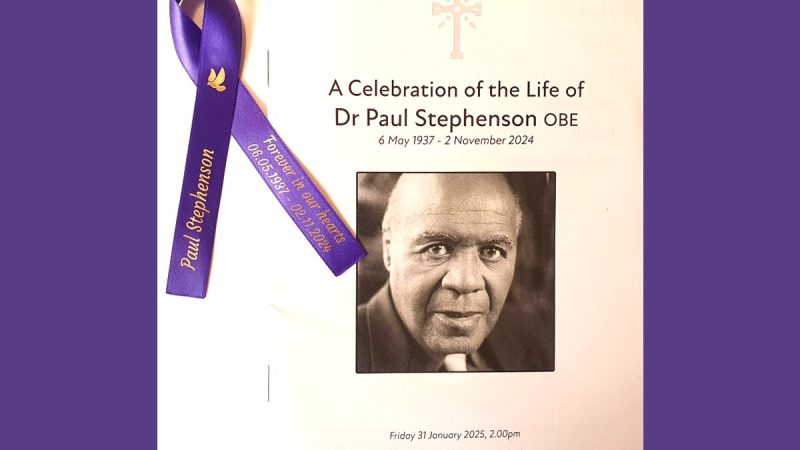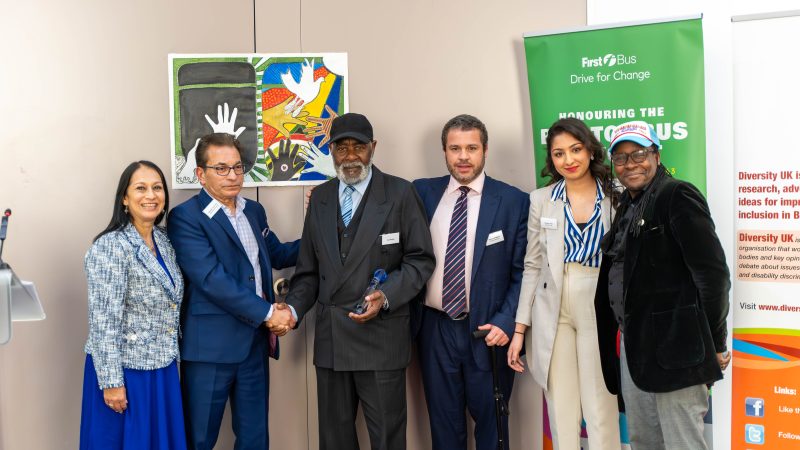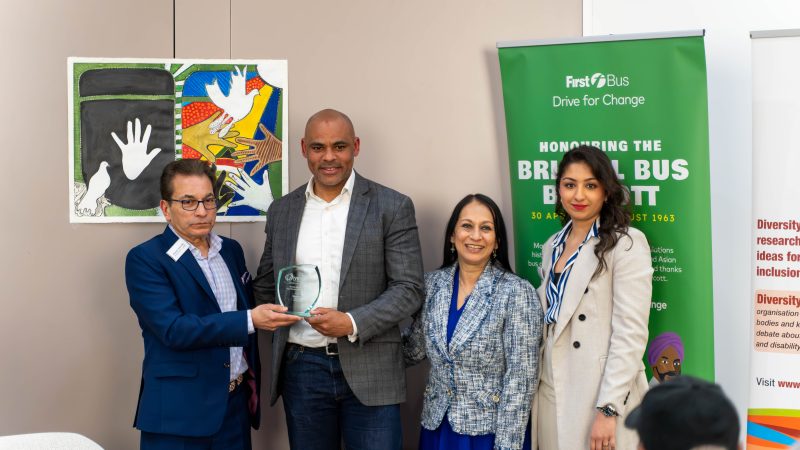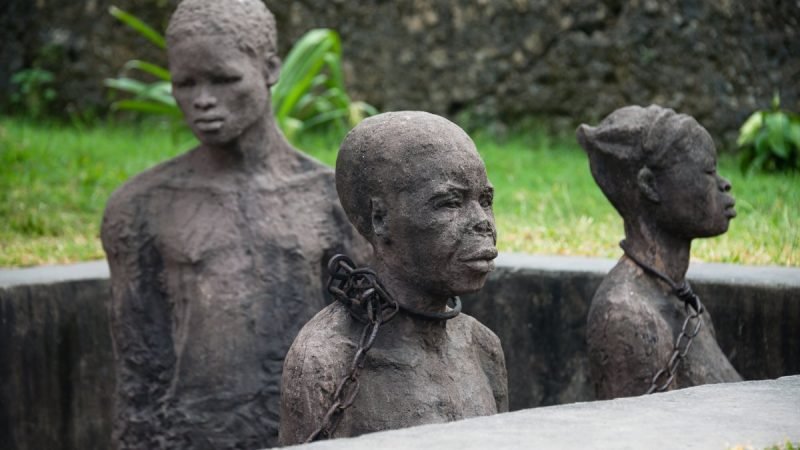Let’s Talk About ‘Labels’ roundtable discussion, 2nd Feb 2022
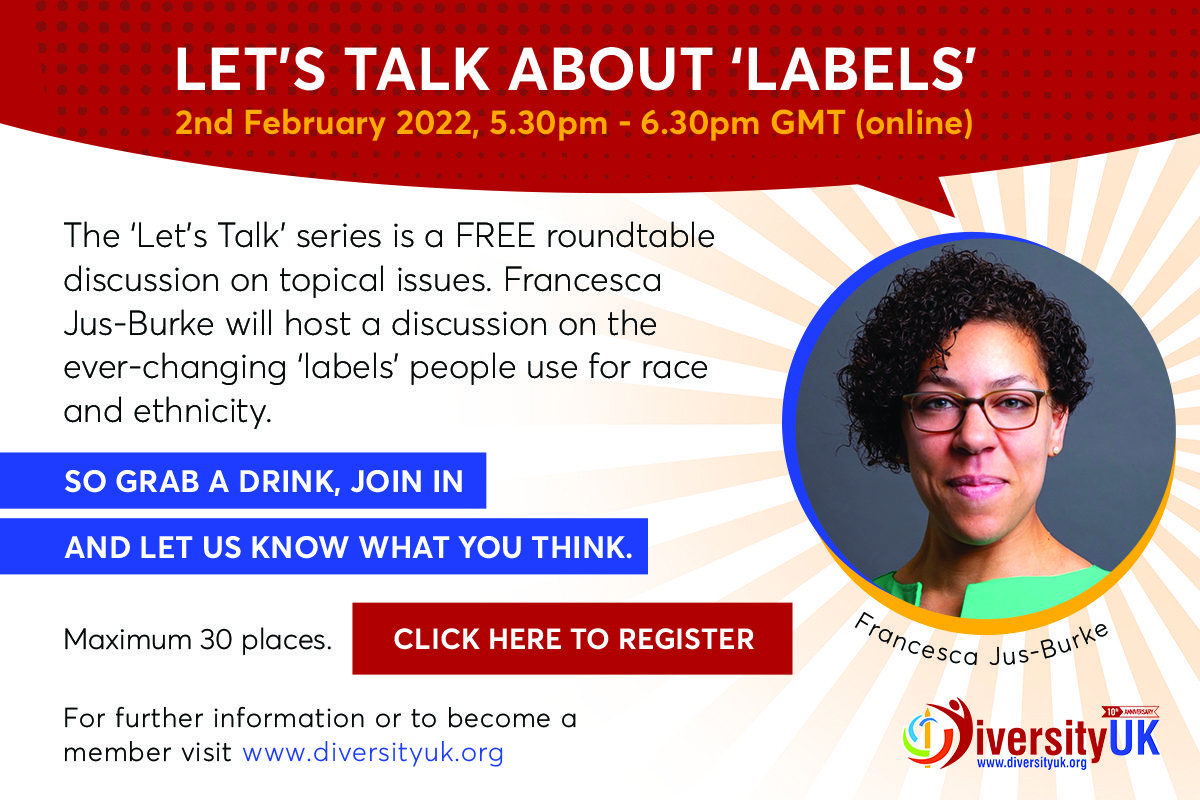
The 'Let's Talk' series are FREE roundtable discussions on topical issues. On 2 February 2022 at a 'Let's Talk About 'Labels' online roundtable, Diversity UK Trustee Francesca Jus-Burke will host an open discussion on the frequently changing and often personal 'labels' people use for race and ethnicity.
For example, when talking about minorities as a whole, should we use BAME, BME or ethnic minority (or none)? The term BME, an acronym for Black & Minority Ethnic people, or more recently BAME (Black, Asian and Minority Ethnic), have long been used in the UK to define people from an ethnic minority. In the UK, that's approximately 14% of the population. In the USA, and other parts of the world, POC (People of Colour) or BIPOC (Black, Indigenous & People of Colour) are preferred. However, in March 2021, the Government Commission on Race and Ethnic Disparities recommended that the government stop using the term BAME and in December 2021, UK broadcasters committed to avoiding the use of the acronym BAME "wherever possible" following the publication of an industry report, for the reason that (amongst others) the term homogenises culturally distinct social groups.
Indeed, in a 2019 Civil Service blog, Zamila Bunglawala, Deputy Head of Unit & Deputy Director Policy and Strategy, Race Disparity Unit, Cabinet Office argued "Please, don't call me BAME or BME!" on the basis that "I have never referred to my ethnicity using BAME or BME, and I don't like it when they are used to describe me. Like many ethnic minorities, I proudly refer to my specific ethnic identity – my background is Indian."
Terms such as non-white are often considered even more derogatory. After all, we do not say "non-Black" to describe white communities (though interestingly, "non-disabled" is a recommended term when writing about disability). And although defining someone by their race rather than skin colour or ethnicity is better, it still does not solve the problem for many born in this country. If you are born in the UK, but your parents were from other countries does that make you a "second generation immigrant" or "first generation British"? Or if you were born overseas to British parents but living in the UK, are you then a first generation immigrant?
How do you feel about the terms mixed race, biracial and multiracial? In her 2021 article for the London Evening Standard, journalist Natasha Mwansa explores the politics and nuances of using cultural acronyms stating that "POC is just a few steps removed from 'coloured', which is territory nobody should be treading." "Mixed-race", "half-caste" and "coloured" are all terms that have now thankfully been consigned to the dustbin of history alongside openly racist signs saying "'No Irish, no blacks, no dogs" seen in Britain after the end of World War II.
And instead of Asian, should we use the moniker East Asian, South Asian and South-East Asian? Does this even matter? A veritable hot potato, but hopefully grounds for a lively and interesting conversation, so please grab a drink, join our 'Let's Talk About 'Labels' roundtable discussion and let us know what you think.
Maximum 30 places. Click here to register for this discussion.
About Francesca Jus-Burke
Francesca Jus-Burke is a Trustee of Diversity UK and a corporate lawyer at Ince. She is a founding member of Ince's CSR Committee, coordinates the firm's CSR agenda and sits on its D&I Steering Committee. Before joining Ince, Francesca worked as a rowing coach for Putney High School and Barn Elms Boat Club, as a tutor and assessor for British Rowing, and as a sports performer coordinator and mentor for the Dame Kelly Holmes Trust.
Francesca is also a three-time World Championship medallist in rowing and a Trustee of Love Rowing (British Rowing's Charitable Foundation) whose mission is to create accessible and inclusive rowing programmes for communities' that are currently underrepresented in the sport. She started rowing in 2000 through "Project Oarsome", a British Rowing scheme aimed at getting state school children into the sport, and went on to win a medal at the Junior and Under 23 World Rowing Championships a few years later. Having competed in a sport and worked in an environment that is not known for its diversity, Francesca wants to level out the playing field for ethnic minorities in the UK.
About Diversity UK
Diversity UK is an equality charity that aims to advance the education of the public in diversity and inclusion in the workplace, in Britain. It is a Registered Charity (No: 1155189) in England & Wales.
For further information or to become a member visit https://diversityuk.org/
References:
Please, don't call me BAME or BME!
https://civilservice.blog.gov.uk/2019/07/08/please-dont-call-me-bame-or-bme/
Should we still be saying 'BAME' in 2021?
https://www.standard.co.uk/insider/bame-acronym-poc-b73997.html
Writing about ethnicity
https://www.ethnicity-facts-figures.service.gov.uk/style-guide/writing-about-ethnicity
BAME acronym: UK broadcasters commit to avoiding catch-all term
https://www.bbc.co.uk/news/entertainment-arts-59559834
Inclusive language: words to use and avoid when writing about disability
https://www.gov.uk/government/publications/inclusive-communication/inclusive-language-words-to-use-and-avoid-when-writing-about-disability
BAME: A report on the use of the term and responses to it: Terminology Review for the BBC and Creative Industries
https://bcuassets.blob.core.windows.net/docs/csu2021325-lhc-report-bbchighres231121-1-132828299798280213.pdf
Maximum 30 places. Click here to register for this discussion.

